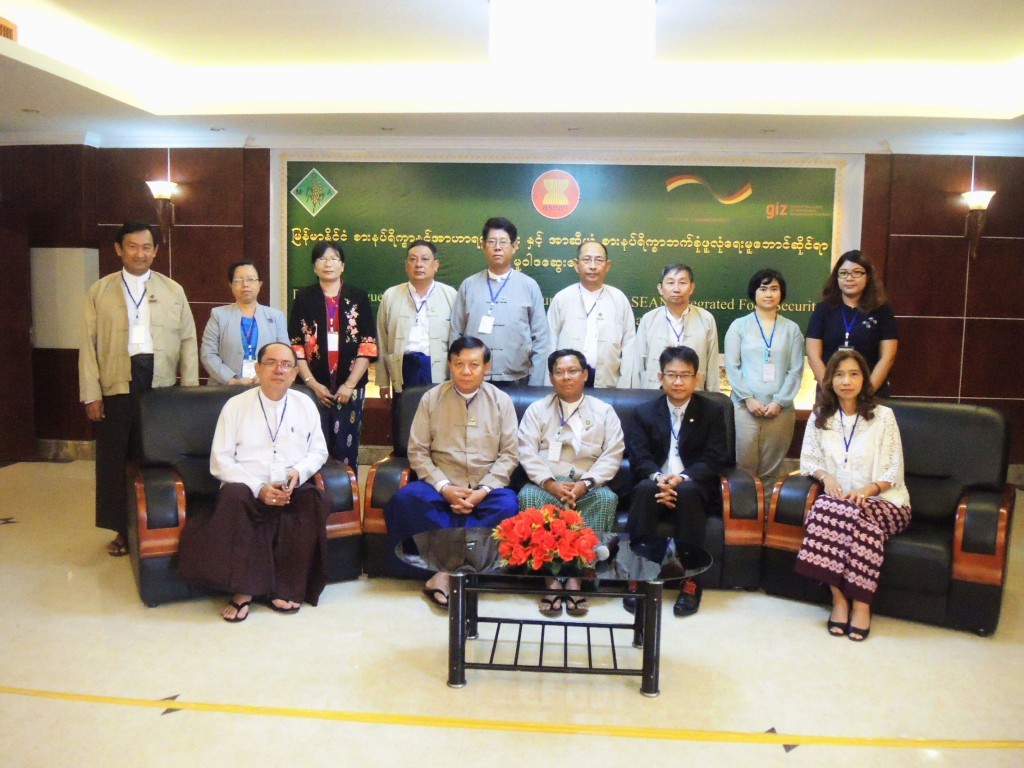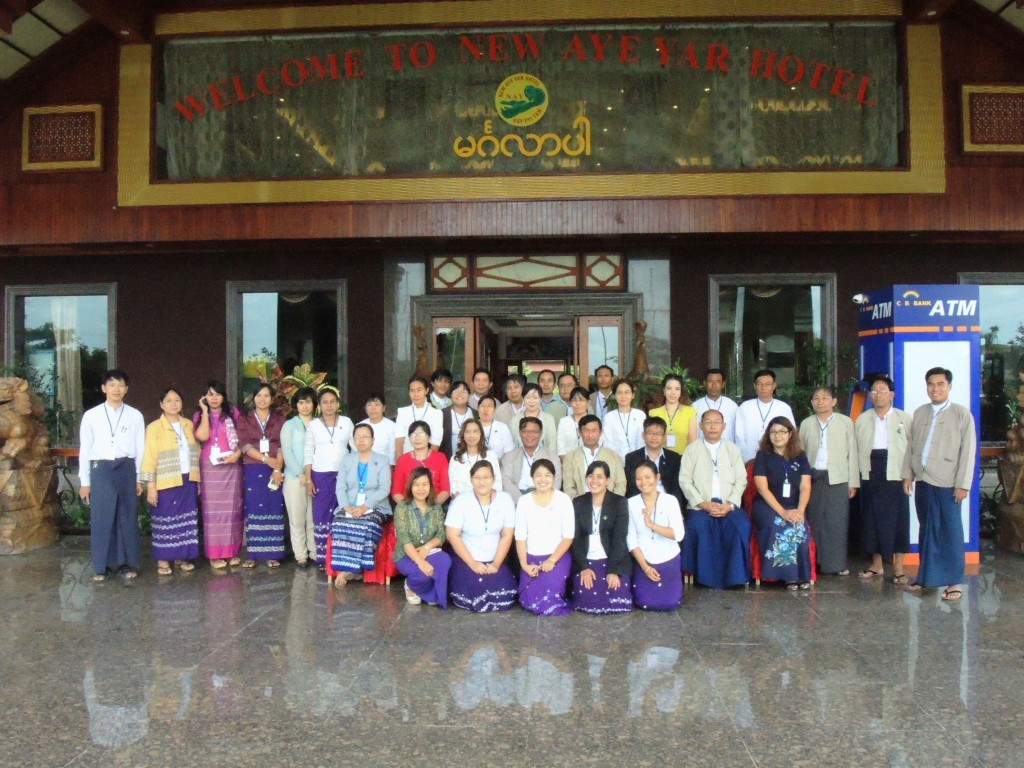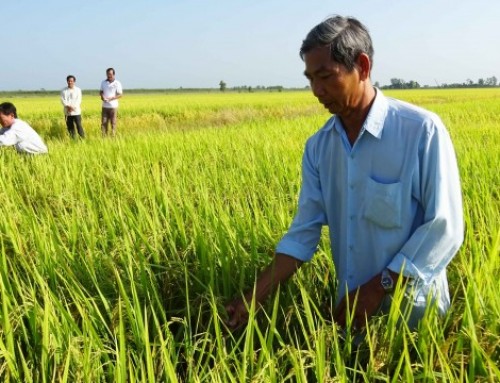High level ‘Policy Dialogue’ discussing national policies on food and nutrition security in Myanmar

Myanmar has been preparing the Development of National Action Plan for Food and Nutrition Security (2015), which will provide a strategy for strengthening the agricultural food and energy sector, including nutritious food production. U Naing Kyi Win, Deputy Director-General of the Department of Agriculture said during his opening and keynote speech at a high level policy dialogue on Food and Nutrition Security and the ASEAN Integrated Food Security (AIFS) Framework at New Ayar Hotel in Nay Pyi Taw on 3rd September 2015.

GIZ team with moderators and panelists for the Policy Dialogue
U Naing Kyi Win highlighted the importance of food and nutrition security in Myanmar through its commitment to eradicate poverty and hunger. He stated that a number of national level initiatives have been undertaken for development of policy and institutional reforms for poverty reduction, national economic development, and human resource development in Myanmar. He believed that this Policy Dialogue would play a significant role in addressing long-term food security and improvement of the livelihood of farmers not only in Myanmar but also in ASEAN Member States.
At the Dialogue, he also emphasised the effort of the Myanmar Government in addressing food security at the regional level by engaging in the development process of the AIFS Framework and its Strategic Plan of Action on Food Security in the ASEAN Region (SPA-FS), 2015 – 2020 and by fulfilling an obligation in providing emergency food stocks to the ASEAN Plus Three Emergency Rice Reserve (APTERR).
The Department of Agriculture of the Ministry of Agriculture and Irrigation hosted the High Level Policy Dialogue on Food and Nutrition Security and the ASEAN Integrated Food Security (AIFS) Framework. The German regional cooperation project’s ASEAN Sustainable Agrifood Systems (ASEAN SAS) supported the event. The project is part of the ASEAN-German Programme on Response to Climate Change in Agriculture and Forestry (GAP-CC) and is being implemented by GIZ (Deutsche Gesellschaft für Internationale Zusammenarbeit GmbH).

During a presentation by Mr. Suriyan Vichitlekarn, Senior Regional Advisor of ASEAN SAS
The policy dialogue provided a platform to discuss and exchange information and agree on recommendations, concrete actions and coordination mechanisms to implement national policies and strategies on food and nutrition security in Myanmar in accordance with national, regional, and global policy frameworks. The AIFS Framework, adopted by the ASEAN leaders in 2009, is thereby the key regional framework for Myanmar. The event brought together stakeholders from the Myanmar Government, Development Partners, Civil Society Organisations and the private sector.
Ms. Pouchamarn Wongsanga, Senior Regional Coordinator of the GIZ’s ASEAN SAS highlighted in her welcoming remarks the German efforts to strengthen food and nutrition security through promotion of sustainable agrifood systems under the AIFS Framework. By this, long-term food security and improved livelihoods of farmers could be achieved.
She emphasised that the Policy Dialogue was a crucial step that would lay a foundation for practical implementation of relevant policies and strategies on food and nutrition security in Myanmar. The experiences and opinions to be shared during this Dialogue would be integrated into final recommendations and commitments that would help making progress towards achieving sustainable food production and food security in Myanmar.

Ms. Pouchamarn Wongsanga, Senior Regional Advisor thanked the Department of Agriculture for hosting the event.
ASEAN SAS provides technical assistance to ASEAN Member States of which a number of cooperation activities have been implemented both at national level in Myanmar and in the ASEAN region. Myanmar has been participating in ASEAN SAS activities including the development of the ASEAN Guidelines on the Regulation, Use and Trade of Biological Control Agents (BCA), which were endorsed by ASEAN Ministers on Agriculture and Forestry (AMAF) in 2014, and the ongoing development of the ASEAN Guidelines on Soil and Nutrient Management, and various capacity development activities to promote food and nutrition security and sustainable agrifood systems.
By definition at the World Food Summit in 1996, food security exists when all people, at all times, have physical and economic access to sufficient, safe and nutritious food that meets their dietary needs and food preferences for an active and healthy life. Sustainable Agrifood systems are a long-term approach towards food security in the ASEAN region as it responds to the region’s special needs. Best practices to achieve sustainable agriculture, to optimise production inputs and the farming practices that integrate climate resilience are being identified and shared. Environment-friendly approaches and the reduction of pesticide use have also come into play to produce safe and good quality agrifood products.
Overall objective of the ASEAN SAS project is to support ASEAN Member States to implement the ASEAN Integrated Food Security (AIFS) Framework and its Strategic Plan of Action on Food Security in the ASEAN Region (SPA-FS). The project focuses on the promotion of sustainable food production at the national level and development of regionally-coordinated policies and strategies for sustainable agriculture as solutions for long-term food security in the region. This includes the promotion of cross-border value chains in concert with public decision-makers, agricultural enterprises as well as farmers and private associations.

Group photo of participants to the Policy Dialogue





